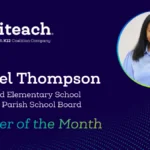As excited as you are for your new career as a teacher, starting your field experience can be anxiety-inducing, especially in the middle of the school year. Usually, as a new hire at the beginning of the Fall, you will receive some type of district training, but that is not always the case when starting mid-school year.
I know this may sound intimidating, but as a recent mid-school year hire, I can tell you that it will all work out. So just breathe and remember to be patient and flexible.
If I could go back a few weeks and tell myself a few essential tips to navigate my mid-school year start, it would be to stay open and flexible, give your students some grace, ask questions, take it all in, and DO NOT strive for perfection. Keep your head high and read on to find ways to navigate a mid-school year start.
Stay Open & Flexible
At my school, our first day after the holiday break focused on professional development with some time to get back in your classroom and prepare for having students the following day. As you can imagine, this is a lot to fit into one day. In addition, if the teachers and administration took an appropriate break, they would also still be catching up on emails and closing up anything from before the break.
What does all of this mean for you? It means that you will not have every single thing you believe you need to be successful on day one, and that is ok as long as you have an open and flexible mindset.
When starting my first day with students, I still did not have an official school ID or school-supplied smartboard, and guess what happened… I could still get into the building and find a way to provide visuals to my students. Was the lesson perfect? Not at all! But the students still completed the task, and we worked through it together.
Give Your Students Some Grace
Your students will have had an entire semester without you. They could be coming from an extremely large class where they could hide away in the back and not participate or complete work, or maybe they had a long-term sub and haven’t been asked to listen in this subject class for months. Whatever the case, these students are adjusting just as much as you are.
When starting the semester, focus on building relationships and procedures first and foremost. Let them know what to expect when they come to your class. Do they need to put their phones somewhere? Do you use Chromebooks? Are there daily assignments that need to be turned in?
Tell them once, and then tell them again and again and again, and do not be offended if they do not listen the first twenty times (yes, I said twenty times!). If you are consistent in your procedures, they will eventually be able to follow along, and it will feel like second nature to them.
An emphasis on getting to know your students will help build trust with them and maybe even make them listen to you before the twentieth repeat. To get to know my students, I focused our first day on a getting-to-know-you activity. The intention was not only for me to get to know them, but also so they could build relationships and get to know their peers. Ask your students if they can name five other students in the classroom; you may be surprised with the answer.
Ask Questions
If you have questions about your roster, lesson planning, or grading, do not hesitate to ask! If you ask your students to be bold and ask questions, follow your own advice. From my experience, it is unlikely that the teacher in the class next door or someone from your PLC will just blow you off. Educators know things are dire right now, and they want to retain more passionate individuals in teaching.
If someone blows you off, go to the next person; I can guarantee someone will support you. With so much going on at a school on any given day, other teachers and administrators have a lot on their minds. You will only be a top priority if you make yourself one!
You may want to be timid and figure it out yourself, but asking simple questions and following up on resources you and your students need will impress your superiors and colleagues AND get you what you need.
It could also save you money! Instead of spending your money on supplies for your classroom, ask the main office admin what they have. For the most part, each school should have basic supplies for your classroom. Even if they do not, it doesn’t hurt to ask and get to know the main office support staff.
Take it All In
It is easy to become overwhelmed by thinking about how the students will respond to you, whether you will find a mentor, will the lesson run smoothly, and the list goes on and on. Yes, there are many variables when it comes to teaching, but if you have come this far, you know this already.
Instead of thinking about all the factors and everything that could go wrong, just take it one day at a time. Incorporate time to reflect on what you are learning: learning about your students, the profession and yourself.
Do Not Strive for Perfection
We have all heard it before, but Rome wasn’t built in a day, and your expertise in teaching will not be, either. You will not be a perfect teacher (I don’t think that exists anyway). You will probably misspeak during a lesson, lose your bathroom pass, call a student by the wrong name, or print the wrong assignment. If you were wondering, yes, I have already done all these things.
You will not be perfect starting in the middle of the year or the beginning of the school year. But as long as you are willing to show up for your students every day, ask questions and challenge your students and yourself, then you will be just fine.
Also, remember that you have a community on your side. If you need support during your mid-school year start, connect with your iteach supervisor, instructional coach, or other teachers going through the program. We all went into this profession for a reason, so remember that ‘why’ and know someone is there for you.





